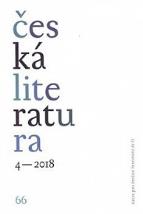Malá forma a její výbušný potenciál
“The small form” and its explosive potential
Jiří Pištora’s Lapkové
Author(s): Josef VojvodíkSubject(s): Czech Literature
Published by: AV ČR - Akademie věd České republiky - Ústav pro českou literaturu
Keywords: small form; art and politics; esthetic existence; gesture; suicide
Summary/Abstract: This paper is based on the eight-verse nursery rhyme by poet Jiří Pištora (1932–1970) Lapkové (Highwaymen), which was directed against the 1968 Russian occupation. When it was printed in Mateřídouška (1970), it was immediately castigated by aggressive rhetoric in Rudé právo as subversive “anti-Soviet propaganda” which was made “all themore dangerous” by the fact that it “abused” young readers. The “small form” of the nursery rhyme had substantial, and for Pištora fatal, consequences, which resulted in his suicide, astheoppressive atmosphere of “normalization” first descended. In connection with the problematic, but influential and still much-debated theory of “simple forms” expounded by the Dutch art historian and literary scholar André Jolles (1874–1946), the question is examined here of the extent to which “small forms” are formative or have a form-determining disposition which can develop an explosive potential under unfavourable social-political circumstances. This question involves the risk-prone, but sometimes unavoidable entanglement of literature/poetry with politics, which came to be of fatal importance to Jolles himself, as he committed suicide in February 1946 in Leipzig. Jolles postulates that at the heart of every “simple form” (myth, legend, joke, saying, case, memorabilia, riddle, fairy tale etc.) lies a “verbal gesture”, i.e. a gestural basis for speech (and text). In line with the “explosion in culture” theory developed by Yuri M. Lotman, an accompanying feature of this conception of explosiveness is unpredictability, which is naturally associated with a certain risk. Explosive processes within culture mean that the sphere of causal relations breaks through into the sphere of unpredictability, but they can also involve a transgressive breach of the boundary between stability and “primedreadiness”. Pištora’s “gestural act”, a children’s nursery rhyme as an ethically and politically motivated “risk-prone gesture”, which escalated into a suicidal gesture, is compared here with an analogous gesture by German poet and essayist Eugen Gottlob Winkler (1912–1936). For both poets, exposed to political persecution by “national communism” and “rational communism” (to use Helmuth Plessner’s terms), their final radical gesture was an attempt to save and consummate their existence as free aesthetic-ethical beings. Their decision to lay down their lives and “give themselves death” (Derrida) is also reflected here in the backdrop of considerations over ethical responsibility and the paradox of self-sacrifice expounded by Jan Patočka and Jacques Derrida.
Journal: Česká literatura
- Issue Year: 66/2018
- Issue No: 4
- Page Range: 504-526
- Page Count: 23
- Language: Czech

